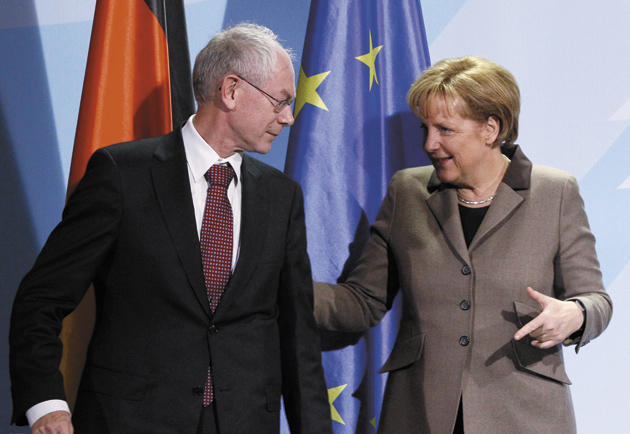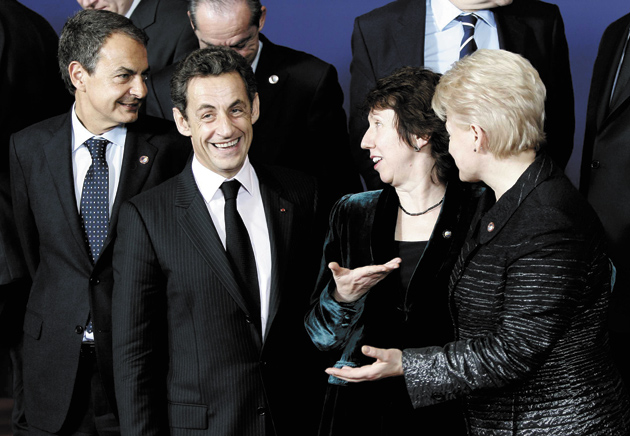Some of our American friends worry that our Christian civilization in Europe (you must remind us about that sometime) is about to be overwhelmed by Islamic hordes—the ramparts of Vienna stormed at last. Others become a little fretful perhaps that we Europeans have forgotten what one has to do in order to matter to the world.
The hope in Brussels is that this may have now ended. Horse-trading there has produced the previously little-known names of the first permanent president of the European Council (Herman Van Rompuy) and of a theoretically powerful high representative for foreign and security policy (Catherine Ashton)—Europe’s first foreign minister, in tabloid-speak. These jobs are the progeny of the Lisbon Treaty and some people believe that they will represent the answer at last to the question that Henry Kissinger says he never asked: “If I want to call Europe to find out what it thinks, what is the telephone number?” Is the answer now more clear? I wish the chosen appointed well, but I am not sure that Europe has suddenly discovered a single voice. Certainly, Mr. Van Rompuy and Baroness Ashton will want to take an early look at the state of the transatlantic alliance. When they look west, what will they see?
First, what flourishes largely unheralded is the marketplace—to the benefit of both sides of the ocean and of the rest of the world too. The Center for Transatlantic Relations at Johns Hopkins University regularly assembles the figures for the flow of trade and investment between America and Europe. The US and Europe remain by a long way each other’s most important commercial partner. Before the financial crash and the onset of the recession the transatlantic economy was generating about $2.5 trillion in total commercial sales each year.
Some think that the commercial ties could be stronger still if only we could negotiate an Atlantic Free Trade Area. I rather doubt the value of trying such an endeavor. Most of the impediments to further trade flows are not tariffs but regulatory issues that need to be tackled one at a time by agencies that are sometimes quasi-independent of government. Consider, for example, how long it took to negotiate a pretty unsatisfactory open skies agreement governing air traffic between America and Europe. European politicians tend to take the success of our commercial relationship with the US for granted. When they go to Washington they look for other things, above all perhaps the assurance that they still matter, that they are still loved, that the US gives a fig about what they have to say about the world’s many problems.
It is incorrect to argue that our neu-rotic “amour propre” has grown because of Europe’s weakness in relation to the US. We were never more weak than in the years after World War II, when our economies were in ruins and the self-respect of much of the Continent was torn to shreds. But we knew then that we mattered. We were at the heart of the geostrategic standoff between Russia’s Communist empire and the US. But how much did we count once the Berlin Wall fell and the cold war ended? Admittedly, we had achieved an astonishing degree of economic integration. We had become, as has often been said, an economic giant, a major trade bloc, a heavyweight player in environmental diplomacy, and the largest provider of development assistance to the poor of the world. Politically, on the other hand, we were a flyweight. Dealing with us in Washington more often meant a choice between the exceptionalism of France or the Jeevesism of Britain rather than a serious exchange about a coherent and sustained European position on sensitive issues such as Russia, the Middle East, or Pakistan.
Our own awareness of Europe’s political inadequacy was increased by the implosion of the Soviet Union and the dismemberment of Yugoslavia. In the 1990s we did at last develop a policy on the Western Balkans, and in Bosnia and Kosovo we fought alongside the US to stabilize the region. But more recently Europe as a whole was saved from having to make responsible international commitments by President Bush’s hapless unilateralism. While it is true that the governments of some EU member states, in Britain, Spain, and Italy, for example, followed Mr. Bush like the Old Testament’s Ruth—“whither thou goest, I will go”—public opinion in Europe was overwhelmingly hostile to his administration’s foreign and security policies.
What did we believe in as Europeans? Simple. We were able to define ourselves—a cost-free and morally uplifting exercise—in contradistinction to President Bush, Mr. Cheney, and Mr. Rumsfeld. It was, to borrow a phrase, a “known known” that if only America had a multilateralist president, we would do such things as partners of the US as would amaze the world. A “known unknown” was exactly what those things would be.
Advertisement
Then Mr. Obama was elected president. He was, maybe to his political cost, Europe’s candidate. He was thoughtful, wise beyond his years, gracefully eloquent, a bold moderate, a star to set beside our own gallery of drab, zany, and nondescript European leaders. (And didn’t they know it, queuing for the chance to catch a little of his glamour in the flash of the camera bulbs.) But what now? How do we respond to the challenge of having a multilateralist in the White House who would like Europe to be a lot more active, for example, in the war in Afghanistan? What is Europe to do?
Let’s begin with how we would be well advised to see the US. For all the talk about multipolarity and a post-American world, the US remains the only superpower, the only country that matters everywhere. You have created between a fifth and a quarter of the world’s output for over 130 years. Your population is still growing, though now the growth is fed mostly by immigration from Asia and Latin America rather than from Europe. You have apparently complete military mastery of the global commons—air, land, sea, space—and spend probably half the world’s total investment in military personnel and technology. As a proportion of your GDP, you spend 2.7 percent—almost twice as much as Europeans do—on universities and “R&D,” and attract as a result to your universities and high-tech industrial parks many of the world’s best and brightest minds.
Given that the US is, more than any other, a global society, the world in microcosm, Americans often seem oddly inward-looking. Julian Barnes once wrote that if one wants to see one’s own country disappear, one only need to go to America and open a newspaper. You are more likely to believe in God and go to church than are Europeans. You guzzle more gas and shoot one another with guns whose purchase is apparently guaranteed by your constitution. You tolerate greater degrees of social inequity while never quite coming to terms—as John Kenneth Galbraith noted—with the concept of reasonable sufficiency in meeting your needs, as a result spending much more than you earn (surely a major reason for our current global economic woes). You are foreign, which sometimes surprises us, and pursue your own national interest—again often a cause of astonishment—especially when your own aims are different from ours, as they are frequently in international economic affairs and as they have been in energy and environmental policy.
So how should our new European phone answerers approach the relationship with you in the Obama years, in a way that catches the President’s attention? How do we avoid having Washington’s indifference increase Europe’s irrelevance, especially if our population falls, our growth rate stutters, our share of world trade and output declines, and the Eurozone itself develops deep fault lines because of the fiscal deficits in Greece and perhaps in Portugal and Spain too? I suggest five guidelines for European policy, with my hopes exceeding my expectations.
- We should dare to believe that what most suits Europe’s interests may also be best for our relationship with America. We should, for example, want to prevent the militarization of nuclear energy in Iran precisely because of our concern as Europeans that Iranian missiles carrying nuclear weapons could reach Europe, not because we are allies of Washington. We should work to sustain democracy in Pakistan and prevent that country from falling to the Taliban and other allied extremists because of our European interest in containing terrorist threats in Europe that are orchestrated through training camps in Pakistan and in preventing a nuclear confrontation in South Asia. That is why we are right to be fighting alongside the US in Afghanistan where the scale of our military and financial commitment will determine how much we are able to help decide both strategy and tactics.
- Our rhetoric about being America’s international partners for peace should not stray too far from the reality. It is true that we tend to align ourselves these days more with Venus than Mars, something for which the rest of the world should be deeply grateful given the history of the twentieth century. We take this, however, a little too far. It is not just that we do not spend enough on hard power: what we do spend—about 200 billion euros each year—is spent badly. Seventy percent of our men and women in uniform are unable to serve outside their national territory. We badly lack and need a common European defense procurement and harmonization of military standards in order to acquire the helicopters, transport aircraft, battlefield communications equipment, and surveillance drones that are necessary for twenty-first-century operations.
For reasons of history, morality, and security, Africa should be regarded as a particular European responsibility. We should deploy our aid, diplomacy, and peacekeeping capacity to support sustainable development, good governance, and regional collaboration on that continent.
- Where Europe has a serious internal policy, it is easier to establish a more serious external policy. The best example of this is energy policy and Russia. At present, we have a growing dependence on Russian natural gas—Russia now supplies 40 percent of the EU’s imported gas—and we have allowed Russia to divide EU member states over energy policy. For example, Germany has entered a close alliance with Russia’s Gazprom to build a new pipeline (Nord Stream) under the Baltic that bypasses traditional transit countries like Ukraine and Poland. Former Chancellor Gerhard Schröder became chairman of the Gazprom shareholders’ committee for a large fee shortly after leaving office. At the same time, a rival EU project called Nabucco aims to bring gas from the Caspian region, but Gazprom has attempted to gain a lock on gas imports into Southeast Europe as well by building another pipeline to compete with Nabucco.
Russia’s aim is plainly to increase European dependence on its gas supplies. In the absence of a common approach on energy, we are in danger of making some of Richard Perle’s dark warnings in the 1980s about Russian use of energy as a weapon of influence come true. But big energy companies in some European countries—France, Austria, and Italy as well as Germany—continue to cut bilateral deals with Russia, and there is opposition to the creation of a single European energy policy that would enable Brussels to speak with one strong voice in dealing with Russia. A single European energy market would require more network connections among European countries and separating the supply of gas and electricity from its distribution.
America’s strategy toward Russia largely focuses on the amount of Russian support it can acquire for collective policies on global issues that concern the US, and usually all the permanent members of the UN Security Council: Iran, North Korea, and nuclear disarmament are prime examples. Europe’s main concerns with Russia are the security of our energy and the stability of the region between the EU’s eastern flank and Russia’s western borders. Here, we have a profound disagreement with Russia, to which we are too reluctant to admit. Moscow has a nineteenth-century view of spheres of influence in Europe. It wishes to constrain the sovereignty of its neighbors, like Ukraine and Georgia. We want neighbors who are prosperous, democratic, and independent.
Advertisement
Dealing with Russia has probably been the biggest failure in the attempt to make a common European foreign policy. To build such a policy requires us, as I have just argued, to frame a single energy policy, with a pan-European market and the application of the normal EU rules of competition in order to break up the near monopolies of national energy companies like Italy’s ENI and Germany’s EON. Curiously, some of those who are usually in the vanguard in arguing for “more” Europe are most reluctant to move in this direction on energy, and some of those who are customarily resistant to greater European competence (like the UK) are strong advocates of a much stronger energy policy.
- European external policy is invariably most effective the closer its object is to home. We are at our best in our own neighborhood, and as it happens at our worst—look at Russia—as well. The greatest success of Europe’s external policy has been the enlargement of the EU. This has promoted and consolidated regime change without the use of weapons and has stabilized our continent. This happened first when Spain, Portugal, and Greece shook off authoritarian regimes, and then again when Russia’s empire broke up.
The job is not complete. The prospect of EU membership is at the heart of our policy in the Western Balkans. We are committed to Ukraine’s “European vocation” but not to its membership in the EU. Spot the difference! Instead of fudging and prevaricating on this issue, we should have given Kiev a realistic program and a timetable for the reforms it needs to undertake in order to acquire the status of a negotiating candidate for EU membership. Without this, the more democratic, West-leaning political forces in Ukraine will continue to lose ground to those closely aligned with Russian industrial and political interests.
So far as Turkey is concerned, we undertook years ago that we would negotiate EU membership once the country became fully democratic with an open economy and respect for human rights and the rule of law. The more Turkey has reformed, the more some European leaders have shown their antagonism to the whole idea. There is a danger that the question, which could be an existential one for the EU, will be resolved by populist prejudice in France, Austria, and Germany, maneuvering behind the worldview of the Greek half of Cyprus, whose leaders scuppered the UN plan for reunifying the country.
For Europe in due course to turn down Turkey would be tantamount to writing ourselves out of any serious script in global affairs. We would be rejecting for membership a country that is an important regional power, a significant NATO member, and a crucial energy hub. We would stand accused of burning bridges to the Islamic world rather than building them.
- My final guideline for policy is this. Europe is not and will not become a superpower or superstate. Unlike the US we do not matter everywhere. We do not require a policy on every problem and every place. But where the problem pollutes much else, and where the region is close to home, we should have a policy that consists of more than waiting to agree with whatever America decides that its policy should be—if it decides, for example in the Middle East, to have one at all, beyond (as in the Bush years) giving carte blanche to Israel. The present no-war-no-peace lull in the Middle East is not sustainable; nor is a one-state solution in Israel/Palestine either possible or desirable.
So what can we do to nudge things forward in a region where America is engaged but not respected and where Europe is neither of those things? At least, we could (with great daring) set out our own policy, beginning with an effort to end the fragmentation of Palestine and Palestinians, especially between the West Bank, Gaza, and East Jerusalem. We could do this, for example, by pressing more actively for creating again a government of national unity in Palestine with which we would deal provided it was committed to a cease-fire with Israel and to a negotiated settlement. Does it matter if Europe is not on the same page as the US or AIPAC? Frankly, no.
I doubt whether President Obama will give much sustained attention over the coming months to the debate in Europe over its relationship with the US. He will instead be thinking about America’s relationship with the great emerging economies—Brazil, India, and above all China—about how best American power can constrain terrorism; about how far domestic politics will prevent him applying pressure on Israel to reestablish a peace process in the Middle East; about nuclear proliferation and nuclear stockpiles; about reducing carbon emissions; and (if he is as smart as he seems) about how to prevent the inevitable splintering of authoritarianism in Arab and Central Asian countries from leading to Islamist extremism.
Were we in Europe to put in place coherent and consistent policies around some of the points I have set out, President Obama might also find that in the next years he has to think about Europe too, about Europe as an independent-minded friend and partner. But clearly this has not happened yet. The President has just told EU leaders that he will not becoming to a summit with them in Madrid in May for which they had been planning. Who can blame him? As the Red Michelin Guide to hotels and restaurants would say, a summit in Madrid was not vaut le voyage.
—February 11, 2010
This Issue
March 11, 2010





